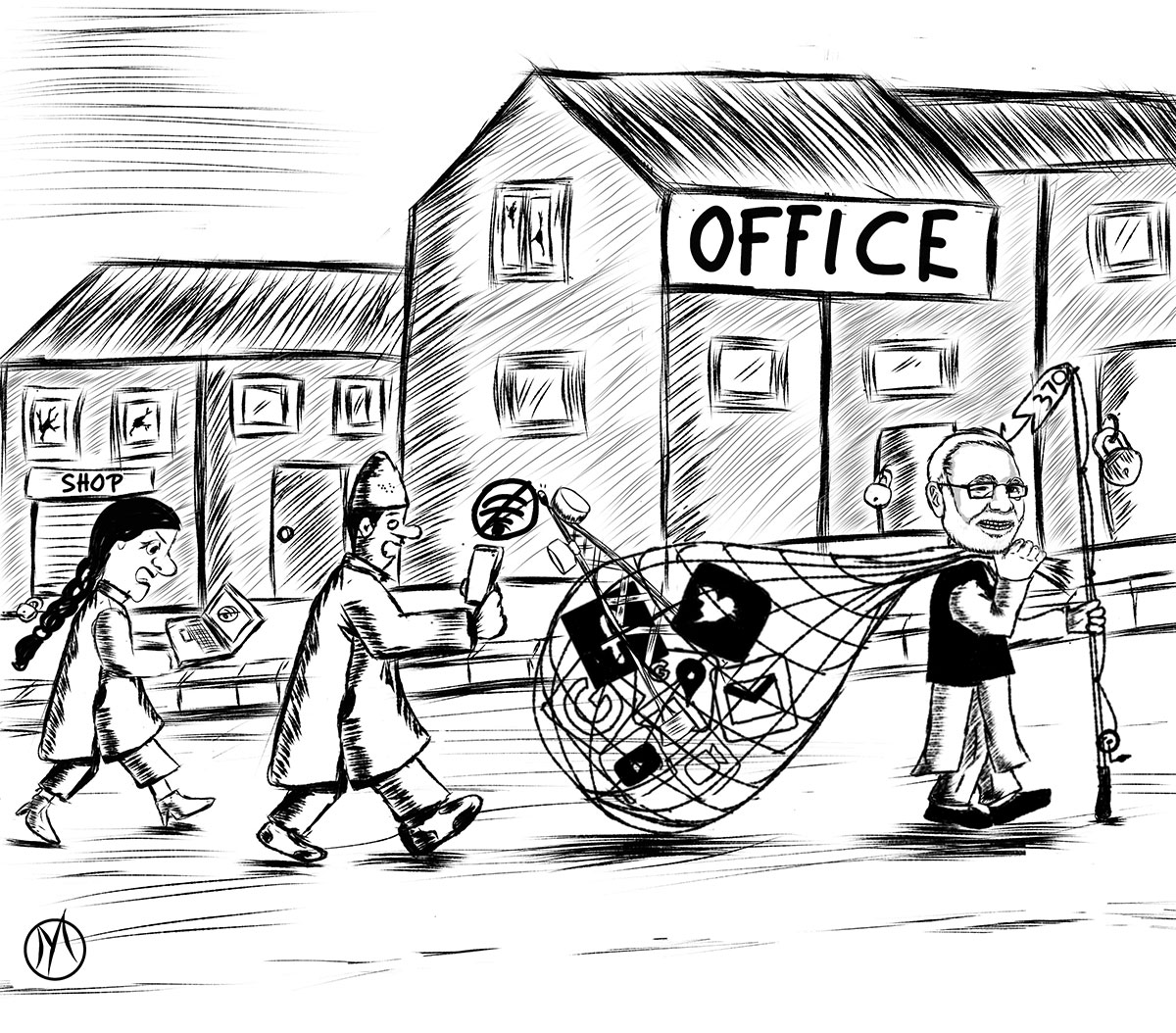by Farzana Nissar
Srinagar
As the low-speed internet was restored in Kashmir, a hope rekindled that people are coming out from the wrong side of the digital divide. Now, living behind firewalls, thousands of people are still struggling to fight the changes that August 5 bought to their lives.

Art Work by Yasir Malik.
Dusk is about to fall and Mukhtar Ahmad, 29, a young boy with towering personality and bushy hair is returning to his home hopeless. A resident of Bijbehara in Anantnag, 50 kms south of Srinagar, he has been wandering all day long in search of a secure job. Having worked for seven years as a security guard in a local car showroom, for Rs 7000 per month, Mukhtar was denied his salary of three months, post-August 5. Being the lone breadwinner of the family of five, he had to find an alternative.
“I remember when my four-year-old daughter asked for a chocolate and I could give her nothing but a hug,” a dejected Mukhtar said. “That night I cried as much as I could.” He then worked as a labourer in nearby apple orchards to feed his family. As the harvesting period in Kashmir came to an end, he again found himself jobless.
Why he didn’t join the showroom back? He said he has lost respect for that job. “This job gave me nothing when I was in need, what good would they do to me now?”
Few doors away from Mukhtar, Omar Ali is sitting in the kitchen of his modest one-storey house, with Kangri under his Pheran. While sipping hot tea prepared by his mother, Omar is conversing about his plan to move out of Kashmir for a job.
“You never know when the situation might change here in Kashmir, I don’t want to take any risk of staying back here and let my family suffer,” Omar said.
Back in September 2019, as Kashmir’s lockdown entered its second month, Omar sensed that it means job loss for him but contrary to his expectations, he got the salary of three months. His happiness was short-lived as his fears came true – he was terminated from his job of Sales Expert of Samsung mobiles, back in December. Omar lives with his parents and the family solely relies on his earnings for a livelihood. “The company cancelled the contract without any prior information. My work is dependent on sales, and since August we were not able to sell a good number of mobile phones.”
People working as employees in different private companies aren’t the only ones facing the brunt of the recent shutdown but those who had initiated start-ups of their own also suffered a lot. Rabia Jan (name changed), a resident of south Kashmir’s Kulgam, is married to Sajad Ahmad, a bus driver. After two daughters were born, he was diagnosed with cancer.
In order to manage the expenses of Sajad’s medical treatment, Rabia sold all the jewellery. Last year, with the help of a bank loan, she started her own boutique and bought his husband an auto-rickshaw. Rabia got her children admitted in a private school and the money she earned from her boutique was spent on them.
“The money that my husband bought home helped us to meet everyday needs and pay for his routine health check-ups,” Rabia said. But after central government announced the abrogation of Article 370 and stripped J&K of its statehood, days have been very harsh for the family since then. Neither Rabia nor her husband was able to move out of the house to make a living. “It was only after my parents lent us some money that we paid the school fee of our children,” she said, as she readies her younger daughter for tuitions.
Although the couple has resumed working again but what concerns them is the return of money to the bank. “We haven’t paid the monthly loan instalments since September. Without any earnings, it was impossible to do so.”
It is freezing outside and Zahid Ahmad, a young boy in his 20’s is watching TV at his home in Ashmuqam, a village near famous tourist destination Pahalgam. Two years back Zahid’s elder brother met an accident which left him handicapped for life. Since then the whole responsibility of the family came on Zahid’s shoulders. Zahid started to work as a promoter from Anantnag for Vivo Mobiles to run his family of five. But the situation which prevailed post-August 5 left him jobless.
When post-paid mobile services were resumed in the valley, the first number he dialled was that of his boss. “I was in shock when I came to know that I, along with a number of my colleagues, have been dismissed from our jobs,” said Zahid, as he continues to change channels on his TV set. The family has been managing with whatever little was left from earlier savings.
A graduate from a local college, Zahid said that he has no idea what he is going to do now to earn a livelihood. “I wasn’t contacted by my company even after low-speed internet was recently restored in Kashmir. Perhaps they will hire new boys now.”
On being asked if he is planning to join any other telecom company, he says that, “Ye kashmir hai, kabi bhi phone band hosaktai hai (This is Kashmir, mobile networks can be snatched anytime).”
The job losses were reported across the sectors. In certain cases where the employers did not dismiss the employees, they did not give them the salaries because they said they did not earn anything.
Retail apart, the crisis is deeper in tourism, education, handicrafts and manufacturing sector. Estimation by the Kashmir Chamber of Commerce and Industries, suggests that around 4.96 lakh jobs were lost during the last six months.
High speed or low-speed internet will not help. These families will take a long time to rebuild their lives.
from Kashmir Life https://ift.tt/31i74gE
via IFTTThttps://kashmirlife.net
No comments:
Post a Comment